Doctor Sleep by Stephen King

The Shining is one of my Top 5 all time favorite books, and has been for 20 years, and so it was a scary thought that Doctor Sleep could potentially change how I feel about it. Thankfully, that wasn't the case, but I will say that my opinion of Jack is a little... altered.
The Shining is all about Jack Torrance for me; The Overlook, and even Danny, are secondary. Jack's character is so realistic that he could step off the page, swinging his roque mallet, and bellowing "Come here, pup!"... and that's what makes him fascinating and terrifying to me to this day. But I love him, and I have pretty definite opinions of his character: Jack was a fundamentally good but flawed person with asshole tendencies, who was dealt a shitty hand in life, and got in over his head in a situation that he couldn't understand and was massively unprepared for. He was always going to lose against the Overlook, but had he avoided that place, I'm certain that he'd have broken the cycle of alcoholism and violence. Now, after reading Doctor Sleep, I don't think I can say that my faith in him is shaken, but just that there's a crack along the line that separates "fundamentally good" from "asshole". How much of that crack can be blamed on the alcohol is debatable. Probably a lot... but I think that would be a cop-out and honestly I think Jack knows better than that.
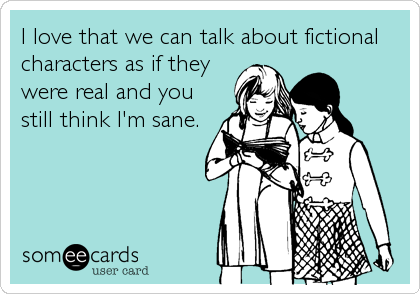
Right...?
So, coming back to Doctor Sleep, I've always felt that Stephen King looked at Danny as his fictional son. I commented on this to my friend on the drive up to Boston, because I was surprised at where King imagined Danny to end up. Of course it made sense, but I wonder if it hurt King to write him there... drunk, and hitting his rock bottom, and wanting desperately to find a good place to escape his own personal demons. I hope it did, because, even though Danny doesn't hold the same place in my heart as Jack, seeing him come back into the world as a violent drunk who hates who he's become was a little painful for me, considering his familial history. I so wanted him to avoid that.
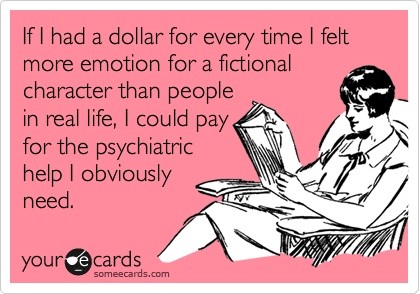
*cough* What?
Unfortunately, I can't say Doctor Sleep came anywhere close to being as great as The Shining, but it was very good for what it was. There were times when I felt that things were rushed along a little bit, and timees that things were a bit too easy, and times when the build-up overshadowed the reveal, especially in regards to the final showdown, but for being a continuation of Danny's story, it was good.
I liked the person he grew into being, and I liked that he used his ability to help those at the end of their lives. I couldn't imagine doing something like that though, seeing the lives of so many people, so intimately, and caring enough to stick it through with them to the end, when even their own family couldn't, or wouldn't. That would be too much for me, but it makes me oddly proud that Danny was able to do it.
As far as Abra... I dunno. I'm more ambivalent about her. I feel like I was supposed to love her, but I just... didn't. Things were just so easy for her, since she was so powerful in the shining, and on top of that, she had a support system - two parents, Danny, Billy, and John. And she was more than twice Danny's age when he had to fight for his life, alone. So I just didn't really feel all that concerned about her, as unfair as it may be. I feel like King went easy on her.
I also wanted to know more about the True Knot. I wanted to truly fear them, but aside from their ruthlessness and their obvious financial means helping them to get away with it, I didn't find them particularly frightening. I wanted more along the lines of Horace Derwent and the dead woman from Room 217, and what I got was the Wicked Witch of the West. Hat and all.
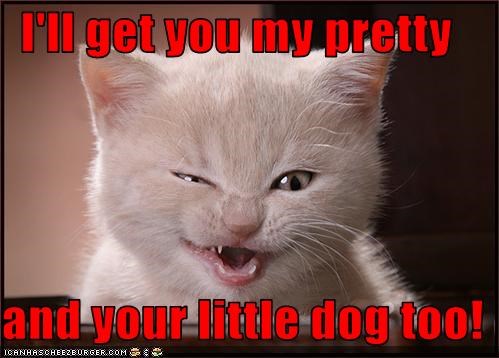
In a way, Doctor Sleep was quite a bit like Black House, and I imagine that people will compare them. I don't think that as stories go they do compare to each other much once they get going, aside from the fact that they both revisit characters who experienced crazy events in their childhood after a long gap of time and catch up with their adult selves. I really enjoyed Black House, and feel the same about Doctor Sleep. And, as with both big-gap sequels, I like that they were doorways into King's larger universe, and now Joe Hill's as well. Some great little Easter Eggs to find there, and I loved that.
So, overall... I liked it quite a lot, but I don't think that it lives up to The Shining. It's a good continuation of Danny's story, and a good standalone novel as well (because it CAN be read that way, if you don't mind getting the really short and sweet version of a recap of The Shining), and I'd definitely recommend it to King fans.
 2
2
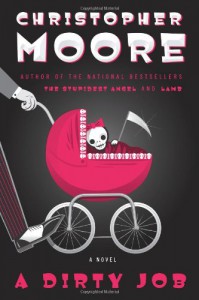 Yeah... I'm counting the Squirrel People as zombies. Adorable, perfectly dressed little animal-part zombies.
Yeah... I'm counting the Squirrel People as zombies. Adorable, perfectly dressed little animal-part zombies. Anyway. I chose this book for my upcoming Real-Life Bookclub because, well... It's Christopher Moore. He makes me laugh, and since this bookclub happens to fall the day after my 31st birthday, I figured some laughing was in order. Because otherwise, there would be crying. Lots, and lots of crying.
(Side note. I have stumbled across a surefire way to tell when you're "old". Watch 15 minutes of Youtube videos featuring kids, pre-teens or teens, and keep track of how many words you hear on the videos that you need to look up on UrbanDictionary.com. If it's any - you're old. I had to look up 3, which means I'm OLD OLD OLD. Hence the crying.)
So, yes. Christopher Moore, laughing. That was to be expected, but what I did not expect from this book was the depth of emotion. And that right there is when I knew that I was probably going to love this book. I loved how with a subtle turn of phrase, Moore could have me laughing out loud or wiping away tears. This was something that I had not experienced before with any of his other books, and I really, really loved it.
I liked all the characters in this one as well. They had their quirks, as per the Moore Standard, but they weren't over the top. I sometimes feel that writers trying to go for quirky and funny generally step over the line into the Too Much zone. But I don't think that Moore has that problem, at least not in this book.
I did find certain key things to be quite predictable, and that's why I've dropped a star off the rating, but overall, I really loved the book and would wholeheartedly recommend it.
And now it's time for me to go to bed, because I'm fighting off a cold and it's like 2am. *sigh*
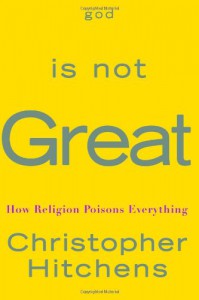 Not long ago, I watched a couple of those "How The Universe Works" shows, and it kinda traumatized me. In however many billions of years, the sun is going to die, and slightly before that the Earth will be incinerated, and everything that we are, were, will be, and will have built will cease to exist. I can comprehend that. Earth's only one part of a solar system in a tiny part of one galaxy of hundreds of billions of galaxies that exist in the vastness of the universe.
Not long ago, I watched a couple of those "How The Universe Works" shows, and it kinda traumatized me. In however many billions of years, the sun is going to die, and slightly before that the Earth will be incinerated, and everything that we are, were, will be, and will have built will cease to exist. I can comprehend that. Earth's only one part of a solar system in a tiny part of one galaxy of hundreds of billions of galaxies that exist in the vastness of the universe. 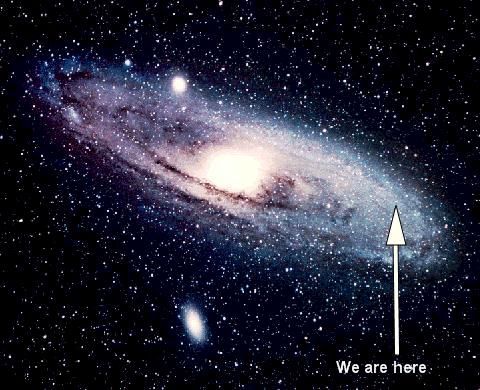
See? I know that someday (thankfully not very soon), Earth is a goner. But what's hard for me to comprehend is that eventually, the rest of the universe will end too. That's just mind-boggling to me. That something so vast, and so seemingly infinite, can just end... well, it makes me almost wish that there was something more, to almost want to have faith that there is some sort of creator who set all of this in place and then breathed life into it, and who has a plan and a purpose for what it will eventually become, rather than there being nothing but a ticking clock until the end of everything.
Almost, because it's sometimes comforting in the face of the end of all existence.
But I don't. Even if I DID have that faith, that would be all. I could never be religious, because I don't believe in religion. And that is the crux of this book for me.
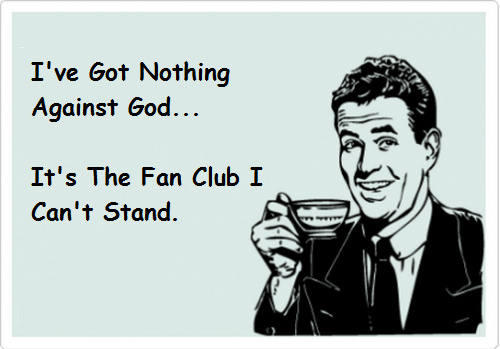
A little anecdote before I continue: A couple weeks ago, The Boy's family came to stay with us for a few days to visit. They are religiousy, grace-before-dinner (heh, almost typo'd 'sinner' there), "God has a plan" types, who give God credit for everything. They hit all green lights driving through town? God was with them, etc. I try not to get sucked into conversations about religion with The Boy's grandma, because she's a sweet lady who just can't see things being other than how she sees them, and she believes that she's only trying to help me "find God". I know she wouldn't understand my lack of desire to have anything to do with religion, so I just avoid the topic altogether whenever possible.
The last day of their visit, the inevitable happened and she cornered me while I was making dinner:
Her: "So, have you found a church yet?"
Me: "Umm, no... OhIhavetocheckthefoodnow... *mumblemumble*"
Her: "Oh, well you'll find one... you just have to keep trying! You know, you'd really like my church. It's the biggest in the area. We have to drive 45 minutes to get there, but I really like it because it's got gold on the windowsills and they've got their own TV and radio stations and..."
(I zoned out around this point, just holding up my end of the conversation by muttering "Oh?" and "That's nice..." every time she stopped for air.)
Then: "So, why don't you go to church?"
Me: (DAMMIT!!) "Oh, well... I don't believe in organized religion."
Her: "Oh, you mean like those Catholics? They are always standing and sitting and chanting at just the right times! They are really organized!"
Me: O_o "Yeahhhhh... that's not exactly the kind of 'organized' I meant..."
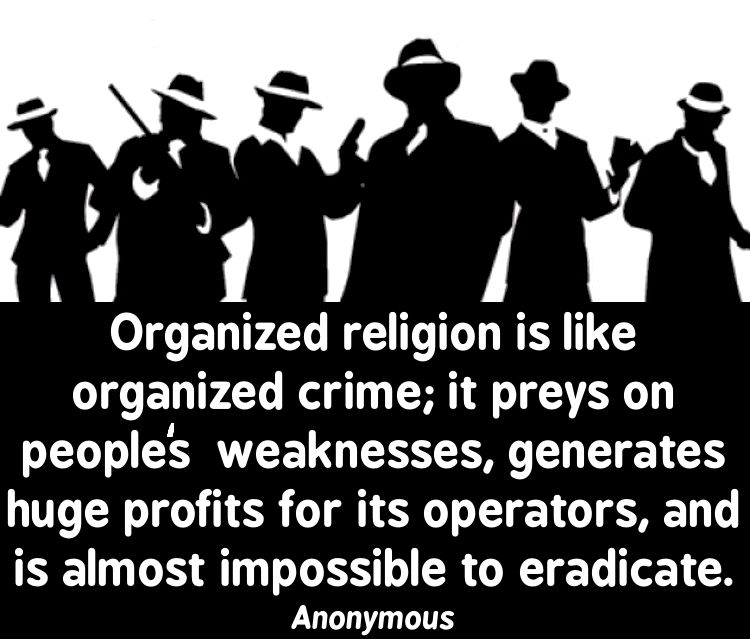
Hitchens' point, as the sub-title indicates, is that RELIGION poisons everything. Simply put, it's a pissing contest, winner decided by headcount (or body count, as the case may be), between groups who are each claiming that THEIRS is the Right and One True Religion... and thus intolerance and hatred and fear is born. Religions tell people that they are going to spend eternity in suffering unless they Follow The Rules... when The Rules themselves can cause immense suffering in people, from fear of eternal damnation, to circumcision (both male and female), to homophobic violence, to genocide, just to name a few. Seems like a lose/lose to me.
Organized religion seeks (and too often succeeds) to exert control over people's thoughts and behavior, imposing standards of purity that are nearly impossible to attain, even in the most pious believer. But more than that, they also insert themselves into politics, seeking to impose their particular brand of 'morality' on everyone, which inevitably leads to human rights violations and less freedom for people of all beliefs.
Religion spawns creatures of such vile ugliness and pure evil that I can't even comprehend them... And that's just the Westboro Baptist Church.
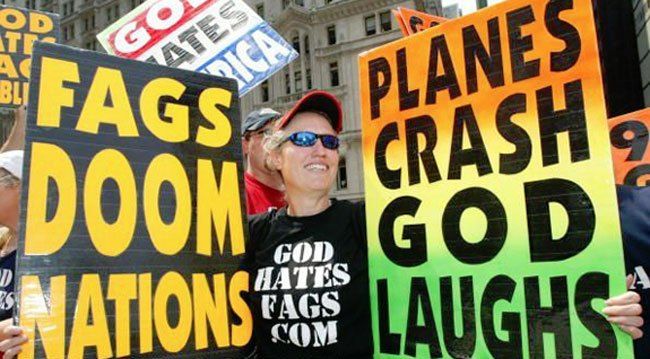
Ahh, such wholesome, joyful hatred.
I agreed with much of what Hitchens said in this book on the subject of religion, because I do think that can be toxic, but we actually differ on the faith aspect. I felt uncomfortable with some of his attitudes toward people who believe in God/Allah/Buddha/Krishna/etc, resorting to dismissive name-calling several times. I realize that this is a fine line for me to walk, because religion and faith/belief are tied so closely together. But I feel like faith/belief in and of itself is not a bad thing, nor does it make the person who holds it stupid or naive or less worthy of respect. I have no problem with faith, or belief in any God, whatever they may be called. That is an individual's decision and it's personal to them. I make no claims of knowing there is NOT a God, so I cannot say anyone who believes in one is wrong.
My issue is when faith is bound up in religion as an institution that uses it as a method of control and intolerance. That is when I feel that a line is crossed, and in my opinion, the result is far more harm than good, if viewed in large-scale terms.
 I never had to read this book in school, but this was one of the first books I had added to my Goodreads shelves when I first set up my account, way back in mid two-thousand-diggity-eight, because, I dunno, I have delusions of wanting to read all of those "Must Read Before You Die" books that people are always raving about.
I never had to read this book in school, but this was one of the first books I had added to my Goodreads shelves when I first set up my account, way back in mid two-thousand-diggity-eight, because, I dunno, I have delusions of wanting to read all of those "Must Read Before You Die" books that people are always raving about. So now I can say that I've read this one... and ugh. Such a waste of my time. Two things got me through this trial: 1) The hope that there would be some redeeming something at the end that would have made it worth it. Unfortunately, there wasn't. Does Holden grow during the story? I thought I spotted a few glimmers of growth, but overall, he's a narcissistic hypocrite who is more phony than any number of the people he categorically judges on sight combined, 2) The Kindle app calculating my remaining reading time. It was like watching the time ticking away until Christmas or something... It seems like it's just NEVER going to get here. I can't even express how excited I was to get to the final countdown... 1 hour... 45 mins... 23 mins... ZERO minutes! :D

As I was reading this, I had thoughts of how I would write my review, full of repetition, repeating, and saying the same thing in seventeen different ways in less than a paragraph, and I'd throw in every single one of the the 395 I-am-not-exaggerating-I-did-a-search-and-there-were-three-hundred-and-ninety-friggin'-five instances in which Holden uses the phrase "and all" in this 277 page book. But I have no patience to imitate this book, considering that reading all of that was about as fun as having a root canal with no anesthetic. (Actually, that comparison is pretty funny, because I actually WAS at the dentist to have a root canal done the last time I read Salinger, and I had no qualms then about putting it down in favor of having my face drilled on. True story.)
It's pretty amusing to me that my reading J.D. Salinger actually constitutes an endorsement for dental surgery.
"Thinking about reading Salinger? Save yourself some pain and irritation, and have a root canal instead! Anesthesia optional!"

So, yeah. There's not really much left for me to say about this. I pretty much hated every minute of reading it. I got nothing out of it. I didn't identify with Holden in any way, and I doubt that I was even jaded enough as a teen to have liked it then. Most likely, I would have just wanted to slap Holden less than I do now. But maybe not... I had less impulse control back then.
Still... I'd like to redeem this coupon please. Recipient, one Holden "Phony" Caulfield.

 I'm actually really surprised by my rating for this one. I enjoyed it quite a bit, despite - or possibly because of - Mencheres being one of my least favorite characters from the NH series. I didn't really cut him any slack here; hot sex or no, I wanted a decent story...and there WAS hot sex. My goodness, it made Spade and Denise from the last NHW book look like they were awkward gropey teens... and that's just not sexy at all.
I'm actually really surprised by my rating for this one. I enjoyed it quite a bit, despite - or possibly because of - Mencheres being one of my least favorite characters from the NH series. I didn't really cut him any slack here; hot sex or no, I wanted a decent story...and there WAS hot sex. My goodness, it made Spade and Denise from the last NHW book look like they were awkward gropey teens... and that's just not sexy at all.Mencheres... well... I may not give up my preference for Bones... but one could do a lot worse than to read about Menchere's naughties. He's GOOD at them.
And on top of that, I actually came to kinda like him toward the end. I realize now that what I didn't like about him before was his monotone aloofness. He's the all-knowing, wise, father-figure who shows up to provide strength, but doesn't really do much else but brood a lot. And for a goodish chunk of this book, he continued on that road... but Kira brought out a new side of him... a lighter side. And I LIKED it. I like seeing Mencheres laugh and tease and enjoy himself.
And I liked that there was no fucking instalove. YYYYYAAAAAAAYYYY!!!!
(O_O)/
Kira and Mencheres didn't just see each other and fall head over heels in lust-I-mean-love - they actually formed a kind of relationship and interest in each other before that. There was a progression of attraction and liking and interest! It actually took me a while to recognize why I was feeling like this was just a better book than FDOC - but toward the end, around the time that Kira realized the significance of the situation in which she met Mencheres, I realized that there's just been this growing connection between them that actually consisted of something more than just saying that there was one.
They have things in common. They have similar pasts (though, admittedly, one's is much more vast than the other's), and similar betrayal experiences, and similar consciousness of the powerless people who could be hurt by their actions... or inaction. There's a base of commonality that their relationship stood on, and I really liked that a lot.
Kira, also, was no moronic girl who couldn't be trusted to tie her own shoes without a man guiding her. I liked her a LOT. She has personality, and spunk, and her own will and damn the consequences. And when those consequences actually bite her in the ass, she doesn't back down or run away or whine or cry about it, but stands her ground and holds her head up, because she is willing to take the responsibility for herself. So good.
I do feel like I would have liked more closure with Tina though - just a quick follow-up meeting with her after everything, to meet the boyfriend as promised. See how she's coping with her new knowledge and family and whatnot.
And I do feel like the resolution was just a little rushed - but still enjoyable.
Definitely much better than I expected for this one to be, and I'd recommend this one over First Drop of Crimson any day.
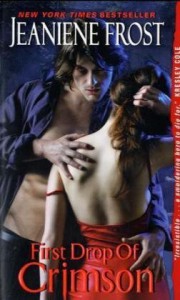 3.5 Stars
3.5 StarsI really enjoyed the Night Huntress series, mainly because Bones is so effing smokin' hot. I liked the pacing and Bones and the story and Bones and the readability and also Bones.
*fans self*
Bones did make an appearance in this book, but in an older-brotherly way, which was a little bleh to me. I don't like Spade the same way as I like Bones, and definitely don't like Denise as much as I like Cat, but it was still a fun, fast-paced book. Though, the whole OMG-YOUR-BLOOD-IS-DELICIOUSLY-INTOXICATING thing was a leeeeetle too Series-That-Shall-Not-Be-Named, and there were some eye-rolly moments of cheesiness. The sex, while not as smokin' hot as with Cat and Bones, was very OH MY, and definitely had me turning the pages.
I will say that since I had read all 6 books of the NH series, I had an idea of what this book was about (it occurs between books 4 & 5 in the NH series, and is hinted at) - but still was quite interested to see exactly what happened. And, you know, despite this being a more romance oriented book -- Night Huntress seemed more UF to me, but with added yummies, this just seemed romance-y from the start -- overall, I really enjoyed this book.
 If you know me then you know that I am NOT a carnival or fair or festival fan. In fact I pretty much hate them. But there's something about Stephen King that will make me pick up anything he writes, whether it's a book about an amusement park or his grocery list.
If you know me then you know that I am NOT a carnival or fair or festival fan. In fact I pretty much hate them. But there's something about Stephen King that will make me pick up anything he writes, whether it's a book about an amusement park or his grocery list. I loved this book. Sure it seems like a simplistic plot line, and in a way it is, but this is Stephen King and he can write characters that I care about, even when those characters are horrible, depraved people.
Oddly enough I actually enjoyed Stephen King's depiction of the amusement park and all of the people in it. Seeing how the place is run, and knowing the craziness that goes into making it such a fun adventure for the 'rubes'was really interesting.
I thought I had the whodunnit figured out,but I was wrong. It was interesting to learn who really did it, but for me this was more of a character-driven story than a mystery driven one. I liked all of the characters in the book, and I was interested to know where they would go in their lives.
Anyway overall I really enjoyed this book, and I would absolutely recommend it to any King fan.
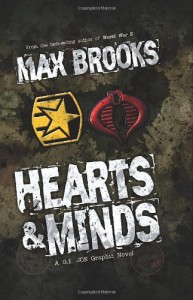 I never really watched or played with G.I. Joe as a kid - that was more my brother's thing. (Though 4 year old me did have a Saturday morning routine to watch He-Man with my dad. I called it "Me-Man", he called it "He-Man and the Bastards of the Universe" which I would promptly correct and scold him for getting wrong. Side story.)
I never really watched or played with G.I. Joe as a kid - that was more my brother's thing. (Though 4 year old me did have a Saturday morning routine to watch He-Man with my dad. I called it "Me-Man", he called it "He-Man and the Bastards of the Universe" which I would promptly correct and scold him for getting wrong. Side story.)Anyway... I never got into the whole G.I. Joe thing, but when I saw this at my local store, and saw that it was by Max Brooks, I had to get it. I mean, I just really like Max's style, and I think that he's one of a short list of authors who make me want to read everything they've written.
I really like how he brings a realism to his writing that I wish was a little more present in writers today. World War Z may be about a fictional zombie war, and may be categorized as horror, but at its heart, it's a story of people, humanity, society, and life. The zombies are just the window that we open to see it.
So coming back to this little graphic novel, I expected the same type of thing, only with the window dressed up in fatigues instead of as the hungry undead, and that's just what I got (though I was a little surprised that it wasn't a story, but rather a series of character snapshots). This graphic novel is 126 pages and covers 13 different members of the G.I. Joe or Cobra factions. Each little vignette offers an insight into the character, and does a fantastic job of it. With each one, you can see a little glimpse into their life, and extrapolate from there as to the rest of it, if one so desires.
Having not known these characters since I was a kid, I don't know if they are true to their original character traits or not. But, I think I enjoyed it all the more for not knowing, because they rang true to me, and their humanity (and sometimes lack of it) felt real.
I liked this quite a lot, and I'm glad that I gave this a chance, despite not being a G.I. Joe fan.
I also really enjoyed the artwork in this, and will definitely need to check out more of these artists' work.
 3.5 Stars
3.5 Stars I really enjoyed Carriger's Parasol Protectorate series, though I was a little disappointed that it ended as abruptly as it did. But still, I enjoy the series, and Carriger's style and wit, and so I looked forward to this one, despite there being a distinct lack of Lord Maccon.
And despite that it's aimed at a much younger audience, which felt a little awkward at first (no yummies with Maccon?? *sigh*), but then stopped feeling so awkward not that long into the story as I got to know the characters.
I liked seeing some familiar names in this book, and that the world was the same. And I liked seeing some characters that we know from the Parasol Protectorate series in their... formative years.
But there were some issues with this book. I felt that the set up went on a little long, and the ending felt a tiny bit rushed. I also missed some of the real wit and confidence that Alexia had, which is born of her being a bit of an outcast, which caused her to become her own woman. I can see the start of that in Sophronia, but I missed it, nonetheless.
There were a LOOOOOOOOOOOT of formatting errors in this as well, and some were hilarious, but I can't really hold that against the book itself, as it was clearly the ebook itself, not the writing. If there's one thing that I can say about Carriger's writing, it's that it's clean.
Anyway, overall, I liked this, and as the beginning of a series I think it was good. I'd like to see these characters grow, and see where the series goes.
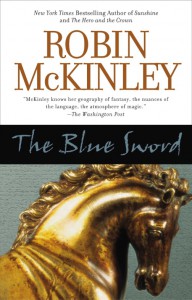 This is my first Robin McKinley book, though I do have a couple others in my possession that need to be read.
This is my first Robin McKinley book, though I do have a couple others in my possession that need to be read. I wasn't really thrilled with this one though. Up until about 50% I was liking it quite a bit, though I couldn't tell you why, because nothing at all had happened. But it didn't take long (or, rather, it took too long) and I started to feel like the story would never actually start, and now that I've finished, all I can say is that it didn't really do anything for me.
It seemed that everything was just a little too easy, a little too square-peg/square-hole... it fit together just too perfectly. There's never a feeling of true conflict or danger that Harry will fail, because she fails at nothing... at least nothing that she does after joining the Hillfolk. Everything that she does, she's the best at. Instantly - or close enough to seem like it.
Learn a new language from the ground up? Ain't no thang! She's fluently translating in no time.
Learn to ride a crazy big, amazingly bred, best-of-the-best, super-smart, intimidating war-horse? She's riding circles around her teacher in weeks.
Learn to sword-fight after never having held anything bigger than a butter-knife in her life? She's winning competitions in less than 2 months.
Defect from the main army to defend an underrated weak flank point and command battles? Got it in one... day.
Need to drop a mountain range on your enemy? 30 minutes. 15 if you exclude travel time to climb to the top of said mountains.
I mean really? I know that she's got this whole "kelar" magical insight/guiding force... thing. But can't she be bad at something? ANYTHING? The fantasy itself was... typical. Nothing special, nothing really compelling or impressive, except that the main character is a girl who has an unknown ability that, unsurprisingly, comes into play all the time to benefit her at just the right times, without her having to do anything at all. Sure, she has to swing the sword and ride the horse, but the magic in her makes her the best at it almost without even trying, and then all the really big stuff just happens by "instinct". There's nothing at all special or impressive about Harry aside from an accident of birth, but this book apparently thinks she's the greatest thing since sliced bread.
And the "Northerners"? The mysterious danger that is such a threat that they are mentioned a handful of times in passing? Aside from them being "different", it's not until they are actually IN BATTLE that there's any kind of information given about why they are so dangerous or scary. And again, most of that is that they are just "different"... oh, and their leader is bloodthirsty and maybe part demon and their horses are double-jointed?
KILL THEM WITH FIRE.
I guess what I'm trying to say is that I found this book to be boringly predictable in the worst way. The story progressed through trope check-points like it was going out of style.
Outlander finds her true "home" with the "enemy"? Check.
She becomes the best of the best of the bestest at everything? Check.
She inspires all the peoples and the beasties to love and follow her? Check.
Saves all the things? Check.
She gets the guy/King? Check.
Bridges the gap between THEM and US? Check.
Boring.
I also felt like the writing style itself was... odd. Sentence structures felt awkward and out of order, leading to this stilted kind of narration/dialogue that felt too formal and too informal at the same time. Maybe that's due to the fact that this book is 25 years old... it's just dated, and feels like it.
I was hoping to like this book, but it was just disappointing in the end. I hope McKinley's other books are better.
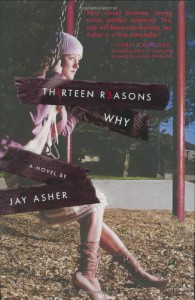 Yet another disappointing bookclub selection. Though, if truth be told, I can't blame this one entirely on my bookclub, because I've wanted to read it for a long time, I just never got around to it.
Yet another disappointing bookclub selection. Though, if truth be told, I can't blame this one entirely on my bookclub, because I've wanted to read it for a long time, I just never got around to it. So, the premise here is that Hannah Baker killed herself, and left a series of tapes as her suicide note, implicating all of the people, including herself, that she blames for causing her to end her life.
If you know me, you know that I love a book that will give me a good kick in the gut. If a book is going to claim to deal with emotional issues, I want it to be real and honest. This? This just felt shallow, and too much of it was just... petty. There was no dealing with emotional issues here, there was just pettiness and selfishness.
A word of warning, there will likely be story details in this review, and it will be ranty.
I can kind of understand why this book has such high ratings on Goodreads. (It currently has a 4.06 average.) This book is the kind that will speak to many people. "Be wary of how you treat people," this book says, "as yours may be the interaction that pushes someone over the edge... or saves them from the brink." But to me, the whole premise just seemed like a cop-out. It was like an exercise in finger-pointing and responsibility-dodging from page one.
This is a sensitive topic, teen suicide. Teens are sensitive creatures and everything is just so much more significant and meaningful. Things that adults would shrug off with a "shit happens" can traumatize a teen for weeks. But there comes a point where you have to decide whether you want your life to be yours, or if you will allow others to hold power over it. You have to be accountable for your own life - nobody else can do that for you. And that's a big, big problem that I had with this book.
I actually thought that this book would deal more with depression than it did. In fact, depression was barely even touched upon. Instead, it was just the finger-pointing and blame game, aimed at teens oblivious to how their selfish teen selves can affect others. And to then expect these same selfish teens to realize that not only are their actions causing hurt, but that they lead to a string of other situations which also cause hurt? When the one being hurt never says anything? To me, I just don't see that as realistic. They are teens being teens, they aren't pyscho-analysts.
Maybe I'm being insensitive. I believe in communicating clearly when you need something, especially if your life is on the line, so I sometimes have a hard time feeling empathy when I feel people don't try hard enough to help themselves. Why should someone else help you if you aren't willing to help yourself? And even then, they can only help if they know you need help.
For instance, if school was so unbearable, why not leave and homeschool instead? Or even just drop out? By my estimation, Hannah was a Junior, so she could have opted to do either one. (I left school in order to homeschool myself in my Junior year, and that was... quite a few years ago. There are even more options now, including online education, etc.)
Why not talk to her parents and tell them she needs counseling?
Why not? Because then she would likely have gotten help, and then there's no book. And then she couldn't enact her vindictive post-suicide guilt-trips.
But wait! I'm sure you're thinking "She DID go to her guidance counselor, and he didn't help her!" Yes, that's true. But she didn't really expect or even want him to, did she? She'd already made her mind up... Why else would she have recorded the session? She'd already decided, and wanted one last person to 'fail' her in order to justify it. Just like with Bryce, Mr. Porter was another person she used to justify her suicidal decision. I think that at the very end, she's actually a little surprised that her plan worked so well.
That sounds cruel, even to me. I don't actually blame Hannah for evoking this feeling in me, though... I blame the author. He made her character shallow, petty, cruel, and unaccountable for her own actions (and inaction), while she held others responsible for every little thing. Things that come with just being teens. The author did this to her, made her hypercritical and hypocritical, and I couldn't identify with her, or feel for her, and seriously disliked her.
I wanted Hannah, who is intelligent enough to piece together this matrix of societal shortcomings in order to lay blame, and intelligent enough to intricately plan her elaborate suicide chain-letter, to be intelligent enough to recognize her own need for help... and to really seek it out and WANT to help herself.
Instead, she cruelly, and sometimes maliciously happily, divides the responsibility of her death up 13 ways and dishes it out like poisoned pie.
When I first started the book, and up until about halfway through, I thought that all of the things that led to Hannah's death happened within a few months of her moving to town. I thought that these thirteen things just stacked on top of each other in a short time, making her life unbearable, and she just was unable to cope anymore with all of it weighing on her - being new, and ridiculed, and harassed, and stalked... But that wasn't the case. She let the situation build to the breaking point over about 3 years. Never once speaking up about her growing depression and desperation, until she decided to put an end to it once and for all.
I'm actually semi-convinced that this was all a huge ruse, and that she didn't actually kill herself, but wants people to believe she had. There are even details that seem to support that: her funeral being held out of town, her parents' store closed and them gone too, her desire to start fresh in a new life, and even her intricate planning of the whole thing. It seems like the kind of thing that someone would want to watch implode. And I absolutely would not put it past Hannah. She seem just vindictive enough to do it, considering that she's made 13 teens complicit in her death - something that will stay with them forever, as she clearly intended.
Maybe I'm reading into that... but we'll never really know, will we? We only see things through Clay's perspective while he listens to these tapes he received in the mail. And Hannah's not quite the innocent victim you'd think... While it's true that she had her own emotional turmoil going on, she sat by and let a horrific violation happen. She did nothing to stop it, when all that would be needed was to make her presence known. She did nothing to report it after the fact, either, even to the unconscious girl who was violated, as though her own decision to give up and shut down negated the other girl's right to know what had happened to her. And it's not as though she was never going to tell... No, she decided to do it via suicide tape. Because Hannah's middle name is "Tact", apparently. That's a violation in itself, and an appalling one, no matter what disagreements they may have had. Disgusting, and just cruel.
Moving on to Clay, our other main character... He's meant to be the White Knight, the counterpoint to the self-absorbed teens populating Hannah's Guilt Tapes. He's harbored a crush on Hannah for years, but was too much of a pansy to talk to her until she was too far gone to accept any kind of friendship. But good lord... he could have A flaw, other than being said pansy, right? SOMETHING. Maybe he was a serial pencil borrower but never returned any of them. Maybe he was a mouth-breather? Anything. No way. The only thing he ever did was lie to his mom with the ever-popular "school project" line and then steal his friend's Walkman. Though he probably returned it. Lame. He is so perfect as to be nausea inducing.
His reactions to her tapes were so damn annoying. He overreacted to nearly every line Hannah spoke. (Though why he continued to do so after she revealed so much of herself is beyond me. )
Hannah: "I was stood up on Valentine's Day. Well, not really stood up, but he was late. And then he touched my knee, and when I didn't tell him not to after he asked if he should stop, he continued and I pushed him out of the booth, and NOBODY even helped me! "
Clay: "OMG WHY?? Marcus, you dick! You asshole! I'm going to punch you in the face when I see you!"
Hannah: "After that, I thought, 'What would happen if I never came back to school?'"
Clay: "No! Hannah WHY? Why couldn't you talk to me? I would have helped you! I could have been there for you!!"
Hannah: "And then I cut my hair."
Clay: "And I didn't even notice. I didn't notice the warning signs. I should have seen. I should have helped her. I should have..." blah blah blah.
He should have grown a pair and maybe tried to talk to her once. In three years.
Anyway... I failed to find anything redeeming in this book. It deals with a topic that I think is important, and that needs to be talked about and part of our education, but I think this book dealt with it extremely poorly. It just turned what should be a tragedy into a game of Pass The Blame - Now With Even MORE Ruined Lives!. And that's disturbing.
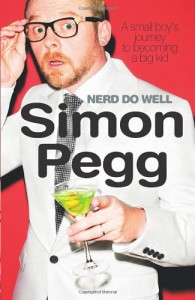 Yeah... so, this was pretty much awesome.
Yeah... so, this was pretty much awesome. I really love Simon Pegg's brand of humor, and I spent a pretty large portion of this book giggling a little too loudly and a little too long. It was actually a little awkward, and there was a moment while listening to this in line at the store (needed kitty litter) that people started to stare. To the other people in line, I was just some crazy lady holding a 30lb bag of cat litter in her arms and giggling maniacally. They had no way of knowing that I was listening to Simon being punked by Canterbury about his obvious and shameful lack of Shawshank Redemption knowledge, despite his claims to the contrary. I mean "Who the fuck is Red?" is fucking genius, and yeah, pet store line people, I'm gonna laugh at that. I'm sorry if it creeps you out because you can't see that I have headphones in... But I'm sorrier that you weren't listening to this geniusness, too.
There's just something about the way that Pegg relates his memories that just tickles me funny-bone, but it's the "fictional" part of this book that really had me cracking up. The interplay between Super Suave Sex Genius Simon Pegg and his sidekick android Canterbury was fantastic. Comedic brilliance.
I really enjoyed learning about the events in Simon's life that led him to be where he is today, and I admit to a little jealousy at all of the adolescent wishes that he has been able to fulfill. Meeting Leia? Acting in a favorite movie franchise? Working with some of the greatest directors in the world? Being able to work doing something that he clearly loves and is amazing at, and with his best friends beside him? Yeah, I'm a little jealous. But truly I'm happy for him, because his good luck (or excellent subconscious choices) has led to many, many people being able to share in his brilliance and awesomeness.
I love the philosophical concept Simon calls the "Laws of Quantum Attraction", which seems to be the driving force behind the myriad ways that his life has progressed along the path that led him to where he is now. This, in particular, really stood out for me:
"We might not know we are seeking out the people who best enrich our lives, but somewhere on a deep, subconscious level we absolutely are. Whether that bond is temporary or permanent, whether it succeeds or fails, fate is simply a conflagration of choices that combine with others to shape the relationships that surround us. We cannot choose our family but we can choose our friends, and we do, sometimes before we have even met them."
Just brilliant. This truly resonates with me, given certain events that have shaped my life and led me to where, and who, I am today.
Anyway, this is a great book. If you have any interest in Simon Pegg, or even just humor, I suggest you read this.
And now, I think I'm going to go watch Shaun of the Dead... again.
 If you were to ask me my top 3 favorite authors, most likely the off-the-top-of-my-head list would be
If you were to ask me my top 3 favorite authors, most likely the off-the-top-of-my-head list would be 1) Stephen King
2) JK Rowling
3) Neil Gaiman
So when I heard that Neil Gaiman had a new book coming out, I was really excited. Really, REALLY excited, to then learn that this was to be a new book for adults. Don't get me wrong, I like his YA books, as I've liked everything that I've read of his. But I love his books for adults.
American Gods is one of the absolute best books I've ever read. It's layered, compelling, intricate, and just plain good. I recently started reading it again, but when I realized that I couldn't really devote the time to it that I wanted, I put it aside. I'll pick it up again one day when I can dedicate my full and devoted attention to it. It deserves it.
So, that being said, I pre-ordered the signed hardcover edition of this book. I don't regret that decision, though I will admit that I am a little disappointed in the story itself. I think that this is a case of unmet expectations, though. Perhaps if "Ocean..." hadn't been advertised as a book for adults, I wouldn't feel this way.
I was expecting something along the lines of a "Neverwhere" type story, (while hoping for American Gods quality) but what I got reminded me very strongly of "Coraline". I enjoyed "Coraline", and I enjoyed this, but I wouldn't call it an 'adult book'. It's told, almost entirely, from the perspective of a 7-year-old little boy. And while I have read adult books that have been told from the perspective of young children, this just didn't have the same feel. The adultness of it was missing for me. That's a very intangible thing, and will be dependent on each reader to define for themselves. I don't know if I can even describe it myself... I just know that I would have no problem at all recommending this book to children of the narrator's age. There's nothing in it that they would find too hard to understand, except for perhaps the single vague and distant sex scene that even the narrator doesn't understand... and is not meant to. As adults, we know what our narrator is describing, but this does not transform this story from a children's/YA story into an adult one. Nor does couching it between first and last "adult perspective" chapters. At least not to me. It just feels like a story told by and aimed at children.
I also just didn't get a very dire sense of danger from this story. Since the story is told in flashback, you know that the main character made it through any mortal danger he may have faced. Likewise, I never felt that Lettie was in any real danger either, since, apparently, she's immortal - or as close to it as possible. The Hunger Birds definitely evoked more of a response from me than Ursula Monkton did... I just couldn't be concerned about her at all. She reminded me quite a lot of the Other Mother from Coraline... but in Coraline there was a sense of tension because it's real-time, so nothing guarantees safety, and aside from the cat, Coraline is on her own. She has help, yes, but it's not the same. Here our main character is rather pathetic, aside from his one act of naive nobility... the exact opposite of interesting, intelligent, and courageous Coraline.
That's not to say that this wasn't a good book. It was. I did enjoy reading it, and I liked the Hempstocks old world Fae feel. There was also quite a lot of quotable goodness in this little story, and the writing was, while simple, quite beautiful. I liked that the main character remained nameless here. Usually I don't really care for that, as it makes it harder for me to identify with a character, but somehow with Neil's stories, it just works.
Anyway, overall, I liked this story, but just liked it. I wanted to love it, but it just didn't quite live up to my expectations. I would still definitely recommend it though, as I would with any of Neil's work.
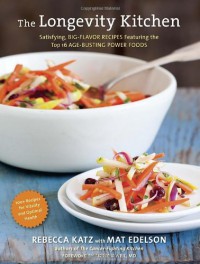 I'm really starting to become more conscious about what I eat and how it affects me, and so I've been doing some research on the subject. I bought a couple books on nutrition and read this one this weekend. Well, "read" in the sense that I read the intro to the book and the sections, but I haven't read all of the recipes yet.
I'm really starting to become more conscious about what I eat and how it affects me, and so I've been doing some research on the subject. I bought a couple books on nutrition and read this one this weekend. Well, "read" in the sense that I read the intro to the book and the sections, but I haven't read all of the recipes yet. I think that this book has a lot of useful info and tips, and I especially liked the section which outlined the specific benefits of certain foods.
There's so much conflicting information on nutrition, and it's... daunting. This was helpful and clearly laid out, which I appreciated. I would definitely recommend giving it a read, but decide for yourself what make sense for you.
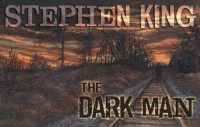 I will be the first to tell you that I'm not a poetry fan. I'm just not. I don't like reading verse, I don't like trying to figure out line breaks, I don't like what is, to me, awkward rhythms and cadence of the words.
I will be the first to tell you that I'm not a poetry fan. I'm just not. I don't like reading verse, I don't like trying to figure out line breaks, I don't like what is, to me, awkward rhythms and cadence of the words. But Stephen King's poetry is somehow the exception to the rule. Well, two of them, anyway. This is probably because I have a higher tolerance for dark and disturbing content in verse format... it just seems to fit inside my brain better than other kinds of verse. And it could be that I don't mind these poems as much partially due to the unconventional formats I've enjoyed them in which are how I will likely always think of them - not straight up poem verse (though I have read them both that way), but in more unique mediums.
Paranoid, A Chant I first read in Skeleton Crew, years ago. I enjoyed it, but it didn't really make an impact until I saw the Dollar Baby adaptation of it, which is available on YouTube: www.youtube.com/watch?v=-pMwSqqc9Ws Fantastic stuff, and the Dollar Baby film fits it perfectly.
With The Dark Man, I don't recall having read it before this book, though I believe it was collected somewhere. But the illustrated format worked extremely well, and saved me from the tiresome task of having to read verse. With a line or a few words on each page, the words can sink in along with the excellent sketchy artwork.
The imagery, both in the text and art, were fantastic, and I loved how the two worked together and complemented each other.
Highly recommended.
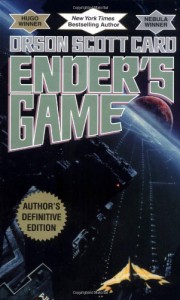 Ugh. Okay. I'm officially giving up on this one.
Ugh. Okay. I'm officially giving up on this one. So, a little disclaimer here. I do not like Orson Scott Card. As a person. I think he's a shitty human who's used his award-winning author status as a platform to advocate the denial of other humans' rights. This is detestable to me.
But that is not why I rated this book 1 star.
The reason I gave this book 1 star, and have given up even trying to read it, is because I do not like Orson Scott Card. As an author. This was the second book of his I've read - or tried to read- and it will most assuredly be my last. I finished the other one, but can't say I liked it, though it was... interesting. This one I just couldn't even muster up any meh over, and it's supposedly his best work. I disliked it almost immediately.
I made it about 15%, and I've read about all I can stands, I can't stands no more.
The writing is awful. We're told what Ender thinks. We're told what Ender feels, and does, and says, and why, and despite supposedly being in his head, I don't understand or like him at all. We're told he's a genius. We're told he's mastered calculus as a toddler, that he can hack school computers with ease. We're told that he plays game A. Then he beats it, and plays game B. In every game, the goal is conquer and kill, and he's the best at it. But we're told that Ender does that only when he's forced... but then we're told that he likes it - no he doesn't! - yes he does. He stabs the game giant in the eye and likes it, and then when the giant is 'dead' and no longer an obstacle, out of boredom, he wishes he could murder it again. Because he liked it. That's why he's The One. Duh.
The ridiculous chapter-leading nameless dialogues are terrible and jarring and distracting, and they take me out of the story. Which is a very bad thing when I'm disliking and uninterested in the story as it is.
The complete lack of characterization is shameful. These kids, and especially Ender, who is SIX YEARS OLD and likes to throw the N-word around like it's a frisbee, sound like adults that I wouldn't even want to talk to, let alone root for. I don't like, understand, or care about a single character in this book. Not one. Wait, I might like the Buggers, but that's only because I feel like they have to be decent if they want to rid the universe of this society of sociopaths and groomed killer children.
Then there's the fact that I'm apparently supposed to believe that a society as advanced as this one, with space travel, in-body monitoring of thoughts and actions of their potential recruits, the ability to at least partially coax out genius children by specialized breeding, etc, would be so casually dismissive of female potential as to respond to a question regarding whether there will be girls at this murder-camp with "A few girls. They don't often pass the tests to get in. Too many centuries of evolution are working against them." Because, apparently, only Y chromosomes can carry intelligence and females are just sub-par, even at evolution. How can they be a war leader and savior of humanity if they can't even master upward evolution, like males have?
Oh, but wait... which entry tests were those again? The ones that require extreme violence? Stomping the shit out of another kid, albeit a bully, was the only test-like thing I saw that earned Ender a spot at murder-school. And it's OKAY that Ender put him in the hospital, because he was forced to do it or keep being bullied. There was no other solution. So maybe that little comment was a backhanded compliment to us of the gentler, weaker sex. Our delicate sensibilities just don't automatically run to murderdeathkill at the slightest provocation, which from what I can tell makes females completely valueless except as future-soldier-makers, so yeah, I guess we fail. Darn!
I don't buy the concept of putting all of the eggs of an apparently critically endangered humanity into a single basket that consists of a child 4 years away from attaining the glorious achievement of double digit age. But wait, this war is apparently on hold while this generation of future soldiers grows up? How awesomely considerate of the "Buggers". I now see why they must die. /sarcasm
Which brings me to the "Buggers". They are aliens. Got that. Apparently, there's no possibility of aliens NOT wanting to wipe out all of humanity... because, you know, the universe isn't big enough for the both of us. I was really, really hoping for a plausible reason why these aliens would want to kill people, but I got nada. Perhaps it's explained later. Or maybe this is just fear and hatred of the unknown. I don't know, and frankly don't care all that much, but it just feels like we're supposed to just go along with the story that implies that different = bad and must be killed.
I'm not squeamish or tender-hearted. I fully believe in killing off characters that need to die, even and especially if it's painful to the reader. Violence, in general, doesn't bother me, and I have no trouble reading about abuse, or death, or destruction, or brutality. But it needs to have a purpose and reason for existing on the page. It needs to be honest, and realistic, and plausible. And I didn't feel like that was the case here. It felt like it was for pure shock value here, placed with ever more aggressive offensiveness with the hopes of a reaction. "OMG! they are just babies! Oh the brutality! Won't someone save the children?!" And it worked, because my reaction is to stop reading this shit called a book. The racism, misogyny, hatred of the 'different', the adult condoned and encouraged cruelty and alienation of weaker or smaller children, the violence and genocidal-tendencies in a 6 year old all made me hate every minute I spent reading, or avoiding, this book, and only confirmed that Orson Scott Card is not someone whose work I will ever read or watch again.
I could go on, but I'm done with this book. Writing it off and washing my hands because they feel like they've been holding something disgusting and slimy. I haven't seen anything even remotely redeeming in this book, nothing that makes me think that the rest of it would be worth my time, and I'm done.
